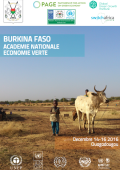

Why aren’t we investing more in disaster resilience, despite the rising costs of disaster events? Decision-makers in governments, businesses, households, and development agencies tend to focus on avoiding losses from disasters, and perceive the return on investment as uncertain – only realised if a somewhat unlikely disaster event actually happens...

How can we live a good life on one planet with over seven billion people?
This course explorez greening the economy on four levels – individual, business, city, and nation. It looks at the relationships between these levels and give many practical examples of the complexities and solutions across the...

The Asia-Pacific GPPEL network project officially known as “Strengthening the capacities and improving the knowledge on green public procurement and ecolabelling in the Asia-Pacific region”, started in 2013 and mainly aims at strengthening SPP and ecolabelling in the Asia-Pacific region, based on the expertise of China, Japan and South Korea...

Hosted by the Government of Burkina Faso, with the support of PAGE, the Poverty and Environment Intiative, Switch Africa Green and the Global Green Growth Initiative, this Academy brings together stakeholders from government, the private sector and civil society to learn about and advance the Green Economy agenda in Burkina Faso...

The LEDS Energy Toolkit is a collection of leading instruments and methodologies for sustainable energy planning. The Toolkit aims to provide energy practitioners, policymakers, and experts a quick reference guide to some of the best established energy planning instruments that are available at no or low cost. The result is...

The webinar takes a look at tools and approaches to assess economic benefits of climate change mitigation measures, from job creation to green growth, with a focus on opportunities in Asia.
The region is already feeling the effects of climate change and is facing the challenge of choosing low emission...

Do you know about the benefits of greening trade? Learn more about how trade in environmental goods and services can drive the transition to an inclusive green economy! The new e-learning course ‘Green Economy and Trade’, organized by UN Environment and UN Institute for Training and Research, starts on 7...

